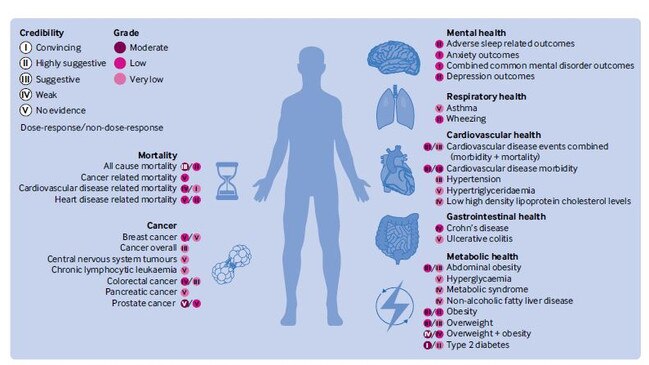Ultra-processed foods linked with over 30 health risks, new study finds
Ultra-processed foods have been linked to more than 30 health risks, with researchers issuing an urgent call for public health to take actions to reduce consumption.

High exposure to ultra-processed foods has been linked to an increased risk of different health problems both physical and mental, according to a new study.
The research underlines the urgent need for targeted measures to reduce consumption of such foods and improve the population’s health.
The findings, published by The BMJ on Friday, found diets high in ultra-processed foods are consistently associated with an increased risk of 32 adverse health outcomes including cancer, major heart and lung conditions, and mental health disorders.
Australian and international researchers carried out an umbrella review of 45 previous meta-analyses from 14 review articles, discovering a higher intake of ultra-processed foods corresponded with a 50 per cent greater risk of cardiovascular disease-related death, a 48-53 per cent higher risk of anxiety and common mental disorders, and a 12 per cent increased risk of type 2 diabetes.
Daisy Coyle, research fellow and accredited practising dietitian at The George Institute for Global Health, said ultra-processed foods have become a major part of Australians’ diets and action must be taken to combat the threat posed to human health.
“Ultra-processed foods, laden with additives and sometimes lacking in essential nutrients, have become ubiquitous in the Australian diet,” Dr Coyle said. “In fact, they make up almost half of what we buy at the supermarket.”
Ultra-processed foods undergo multiple industrial processes and no longer resemble the raw ingredients, often containing colours, emulsifiers, flavours and other additives.
Soft drinks, packaged snacks, baked goods and sugary cereals are considered ultra-processed foods and tend to be high in added sugar, saturated fats and salt, but are low in antioxidants, vitamins, minerals and fibre.

“While not all ultra-processed foods are linked to poor health outcomes, many are, particularly sugary drinks and processed meats,” Dr Coyle said. “Despite mounting evidence of their harmful effects, effective measures to curb our consumption of these products have been lacking.
“Existing nutrition policies in Australia aren’t enough … It’s important that we start developing solutions that target the most harmful ultra-processed foods.
“We need to consider both policies that pull consumers away from ultra-processed foods, like advertising restrictions, warning labels and bans in schools, as well as policies that support consumers toward healthier alternatives such as through subsidies for fresh, nutritious foods.”
Researchers are urging United Nations agencies and member states to develop and implement a framework convention on ultra-processed foods similar to the framework on tobacco, and promote examples of best practice.





